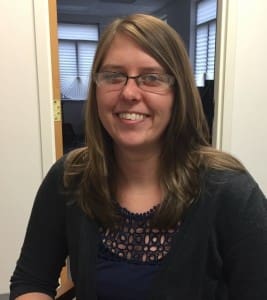 Sarah Dischner, 29, is a Clinical Social Worker based out of BCC’s Charlotte Hall office in southern Maryland. Exclusively seeing youth in BCC’s Treatment Foster Care (TFC) program, Dischner came to BCC in 2015 after seeing schizophrenia patients in Pittsburgh the prior four years. A native of Williamsport, PA, Dischner earned a master’s degree in social work from the University of Pittsburgh in 2011.
Sarah Dischner, 29, is a Clinical Social Worker based out of BCC’s Charlotte Hall office in southern Maryland. Exclusively seeing youth in BCC’s Treatment Foster Care (TFC) program, Dischner came to BCC in 2015 after seeing schizophrenia patients in Pittsburgh the prior four years. A native of Williamsport, PA, Dischner earned a master’s degree in social work from the University of Pittsburgh in 2011.
Q: What attracted you to and motivated you to apply to BCC:
A: I was planning to move to the Maryland area in general and the opportunity with Board of Child Care sounded interesting because working with children was always appealing to me.
Q: What is your title and what does a garden-variety day look like for you?
A: As a clinical social worker for TFC I serve youth and families impacted by complex trauma. A typical morning for me includes compiling notes, prepping for appointments, and completing care plans and other paperwork.
I start seeing youth when school is out, so I spend afternoons on the road and in the community. I conduct one on one visits with the kids, as well as sessions with them and their families. Sometimes this means their biological parents, and sometimes it is with BCC’s TFC parents. I work closely with the TFC team to make sure that both the child and the TFC parents are receiving the support they need.
Q: This is not a typical 9-to-5 job – what makes this work rewarding to you?
A: Being able to help someone make the small changes in their life that translate to big changes for them and their community is what gets me out of bed in the morning. The youth and families I work with volunteer to participate in therapy with me – and sometimes not everyone wants to be there.
Many little engagements are necessary to earn the respect and trust of the child and their family (biological or foster care) to make progress possible.
Q: What has been better than advertised about coming aboard with BCC?
A: Being able to flex my schedule has been a big benefit to working at BCC. If I see someone at eight or nine in the evening, I can come in at 10am the next day so I do not burn out. I have also been impressed with the organization’s effort to make sure practitioners get the help and attention we need.
I feel like supervisors actually care about the staff and having that support has solidified for me the feeling that I made a good decision to join BCC.
Q: You recently found a horse tooth from the Ice Age. What is this all about?
A: Shark teeth, crab fossils, and mollusks all wash up on the shore of the Chesapeake Bay. Calvert Cliff State Park and Flag Pond State Park are two of my favorite beaches to visit. Winter is definitely better than summer for this activity.
A few months ago, I found a tooth much bigger than normal for a mammal. After I posted a picture online, Calvert Marine Museum contacted me and indicated it was probably from a horse and that they would like to see it and study it further. Mammal teeth are rare because typically, during the Ice Age, mammals would die, float out to sea, decompose, and sink – so finding the tooth on a beach is unusual and very lucky!
Editor’s Note:
The version of this article published in Keywords originally listed Sarah’s title incorrectly as an Integrated Dual Disorder Treatment (IDDT) specialist. She is a Clinical Social Worker at BCC. Our apologies to Sarah!